This is the english translation of an older german post. To read the german post, see Was heisst eigentlich REL Competitive?
At the Swiss Magic Masters and similar large tournaments, the stakes are quite a bit higher than at an FNM or similar. The competitive rules aim to guarantee correct play. Misplays can have worse impact and rules violations are tracked to prevent cheating.
When playing at a competitive tournament, it is expected that you know the core rules of Magic. Communicate clearly with your opponent, so that both of you always know in which phase of the turn you are and what actions are being taken. Use a paper notepad with a pen to note both players life totals. Do not use dice or a mobile phone app. With the paper, you not only have the current life totals but also previous life totals, allowing a judge to trackback what was happening when there is a confusion about life totals.
The goal of the competitive rules is to guarantee the integrity of the tournament. Play correctly, but don’t stress it and still have fun at the tournament.
JUDGE!!!
Those who have been at a large tournament, have probably experienced somebody screaming „JUDGE“ at the top of their voice. You don’t need to scream it at maximum volume, but you should ask for a judge if there is any uncertainty or a mistake happened. The judges are at the tournament for exactly this. They are experts with the rules and know how a mistake can be corrected properly.
You are welcome to ask a judge if you are uncertain about a specific interaction of cards. You can ask the judge your question away from the table so your opponent does not hear what card you have. For example, you could ask: „My opponent has Blood Moon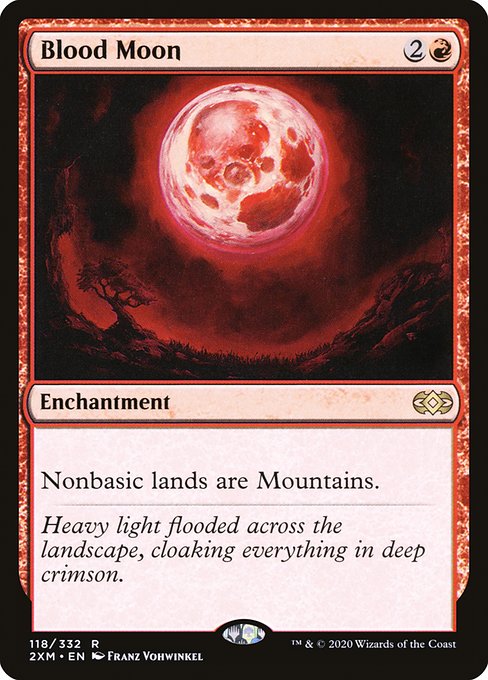 in play, making all my non-basic lands mountains. If i play my Dryad of the Ilysian Grove
in play, making all my non-basic lands mountains. If i play my Dryad of the Ilysian Grove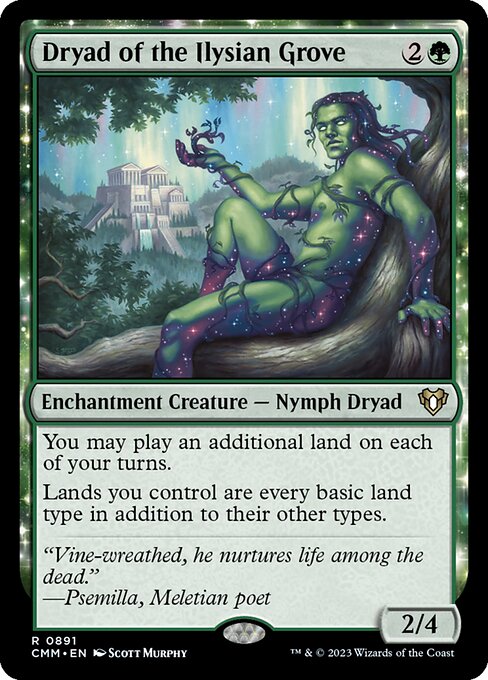 , will my lands be able to generate all colors now?“ Keep in mind that the judge must not give you any tips on how to play – they only will answer the question as you asked it. In the previous example (whatever landed after the other overrides what your lands do) the judge won’t tell you that if your opponent later plays a second Blood Moon, the effect of the Dryad would again be overwritten.
, will my lands be able to generate all colors now?“ Keep in mind that the judge must not give you any tips on how to play – they only will answer the question as you asked it. In the previous example (whatever landed after the other overrides what your lands do) the judge won’t tell you that if your opponent later plays a second Blood Moon, the effect of the Dryad would again be overwritten.
Outside assistance
It is important that the match be played only by the players in that match. During the match, you are not allowed to look at your mobile phone or to ask somebody else than a judge any Magic questions. You are allowed to take notes on your paper pad, e.g. when your opponent had to reveal a card. For sideboarding, you may bring a sideboard guide where you noted which cards you swap in what matchup. You may only look at your sideboard guide during sideboarding, not during the gameplay. You may not use other notes.
You are welcome to watch a match, but must not comment on what is going on to avoid giving hints to the players.
If you observe a rule violation, please find a judge and tell him what you saw. Never try to resolve the problem yourself! If its an important rule violation, ask the players to interrupt their play until the judge is at the table.
Missed is missed
In „Regular“, you can often catch up on something you missed. In „Competitive“, as soon as you moved to the next game action without resolving a trigger, that trigger is missed. There are two variants:
If a card gives you an optional action, if you missed it, it is assumed that you decided to not take the action. For example. If i play Abbot of Keral Keep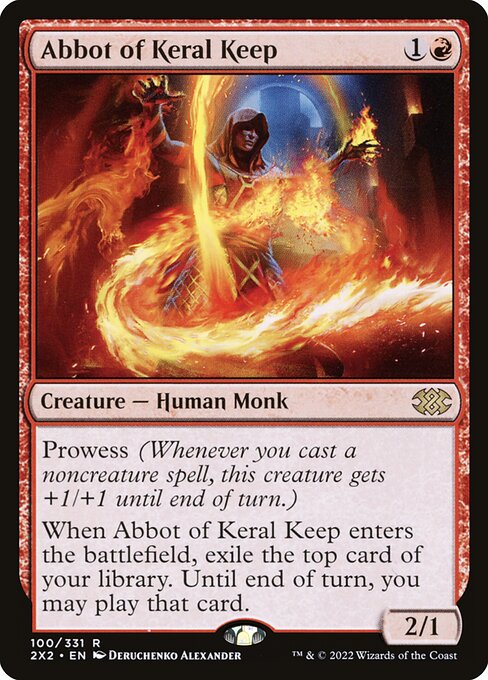 and then pass the turn to my opponent who goes to their upkeep, it is too late to play the card the Abbot exiled.
and then pass the turn to my opponent who goes to their upkeep, it is too late to play the card the Abbot exiled.
If the action would have been mandatory, call a judge. The judge will check what happened and allow the opponent to decide whether they want the action to be taken or not. In the above example, exiling the card when the Abbot enters the battle field is mandatory and the opponent could chose to still have you exile the card. If a missed action is considered negative, you will also get a warning.
For example: I forgot during my upkeep to reveal a card for Dark Confidant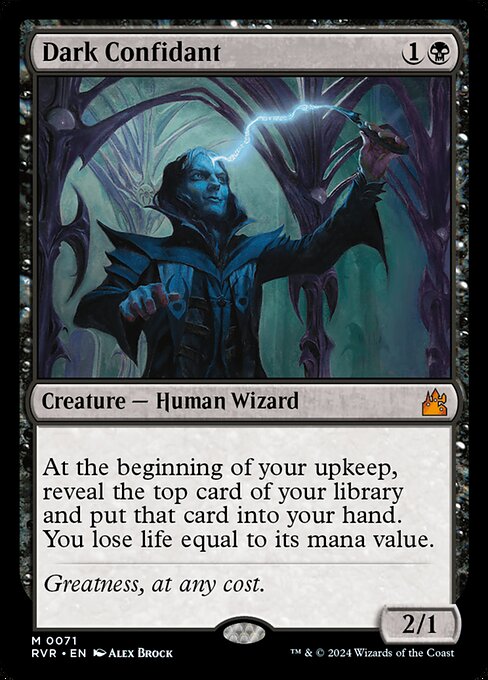 and draw a card into my hand. Depending on my life total, the Confidant could be dangerous. My opponent can now decide if the Dark Confidant
and draw a card into my hand. Depending on my life total, the Confidant could be dangerous. My opponent can now decide if the Dark Confidant trigger is still happening or not.
trigger is still happening or not.
Warnings: Yellow Card
Honest mistakes can happen. Judges also know that and they will react appropriately. You can cleanup small mistakes that you notice immediately with your opponent – as long as both players are convinced what the correct resolution of the situation is. If its something more complicated, or any player is unsure how to proceed, or if any other actions have been taken after the mistake, call for a judge to sort this out. The judge will restore the game into a correct state and issue a warning if there was a rule violation. Depending on the situation, not calling a judge after a rule violation can be considered cheating.
A warning is just that, a warning without any direct effect. Don’t stress it, even players at the Pro Tour sometimes receive a warning. However, if a player makes the same kind of mistake multiple times, the judge will start to watch closely. The next escalation step when the same mistake is repeatedly made is a game loss. The reason is to prevent a player from gaining an unfair advantage by committing a mistake. Repeatedly committing the same mistake can also lead to suspicion of cheating.
The game state needs to be tracked correctly. For exapmle, damage that changes a life total is not a „missed trigger“. If after combat, life totals are not updated, this will be corrected by the judge if it is still possible to reconstruct the situation. Or for example if a create received lethal damage but was not put into the graveyard. It is best practice to clearly tell your opponent life total changes so you both note the same number and can clarify immediately if there is disagreement.
Cheating
When a rule violation is commited, there is the question whether it was an accident or on purpose. Accidental violations get you a warning. Purposeful rule violations however are cheating. When a judge determines that a player is cheating, they have to drop them from the tournament.
For example: I am on just 1 life, so I ignore the Dark Confidant because i am afraid i will lose if i reveal a non-land with it. This is not allowed, i must remember my own triggers and execute them. If i ignored it on purpose, that was cheating and i will be removed from the tournament.
because i am afraid i will lose if i reveal a non-land with it. This is not allowed, i must remember my own triggers and execute them. If i ignored it on purpose, that was cheating and i will be removed from the tournament.
Bluff or cheating?
The harsh punishment for cheating clearly states that you must not do rule violations on purpose. There are however bluffs, which are a legitimate part of the game. For example you could represent a Force of Negation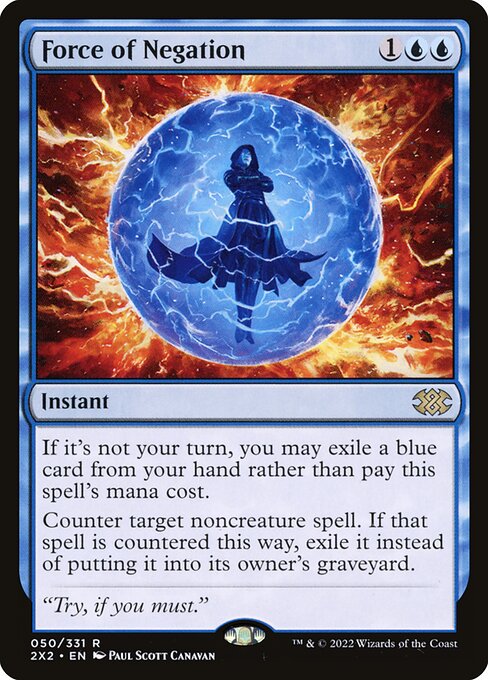 by first telling your opponent to wait a sec, check your cards and then tell „Ok, your spell resolves“ even though you have no Force of Negation
by first telling your opponent to wait a sec, check your cards and then tell „Ok, your spell resolves“ even though you have no Force of Negation in hand.
in hand.
If your opponent has a Chalice of the Void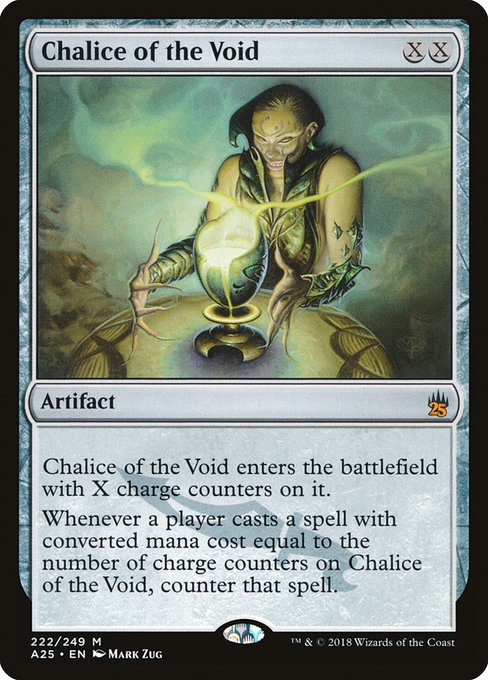 on 1 and you play a 1 Mana spell, you can wait for your opponent to acknowledge the chalice trigger to counter the spell (the wording on chalice makes this a trigger that can be missed by the opponent). If its your own Chalice however, you may not forget the trigger on your own spells. You are still allowed to play cards „into chalice“ (to get prowess or storm count or just to put cards in your graveyard) but you must immediately acknowledge that it is countered. If you try to resolve the spell, a judge will have to determine if this really was a mistake or an attempt at cheating.
on 1 and you play a 1 Mana spell, you can wait for your opponent to acknowledge the chalice trigger to counter the spell (the wording on chalice makes this a trigger that can be missed by the opponent). If its your own Chalice however, you may not forget the trigger on your own spells. You are still allowed to play cards „into chalice“ (to get prowess or storm count or just to put cards in your graveyard) but you must immediately acknowledge that it is countered. If you try to resolve the spell, a judge will have to determine if this really was a mistake or an attempt at cheating.
One more example: You control a Tarmogoyf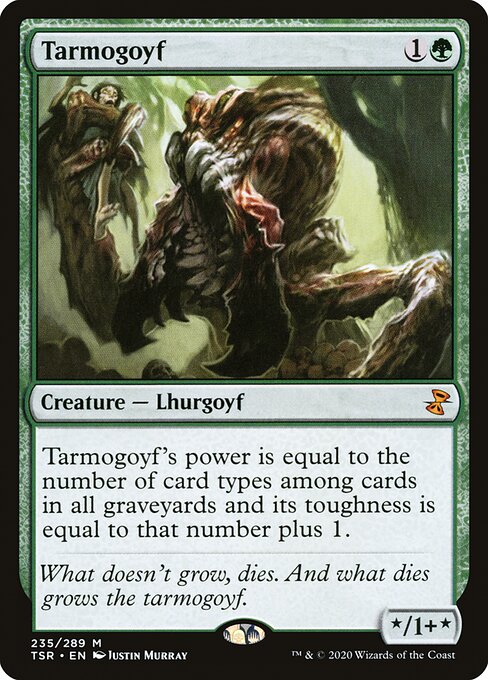 , your opponent asks what types of cards are in your graveyard. You are not required to tell them the number (although it would be the polite thing to do and speed up the game). As always, your opponent has the right to see the cards in your graveyard and count for themselves. If you tell the number however, it must be correct. If you announce a wrong number to decive your opponent into thinking your Tarmogoyf
, your opponent asks what types of cards are in your graveyard. You are not required to tell them the number (although it would be the polite thing to do and speed up the game). As always, your opponent has the right to see the cards in your graveyard and count for themselves. If you tell the number however, it must be correct. If you announce a wrong number to decive your opponent into thinking your Tarmogoyf is bigger or smaller than it is would be cheating.
is bigger or smaller than it is would be cheating.
No bribary, no random determination of the match winner
It is strictly forbidden to offer to a player, a judge or the tournament organiser anything to determine a decision in the game. It is also strictly forbidden to use a random method to determine the winner of a match.
The following things are not considered bribary and therefore allowed:
- Players agree how they would split prices they have not won yet, if it does not change the match result
- Players in a last round agree who will be official winner of the tournament and how to split the prices
- All players still in the tournament (e.g. top 4 or top 8) can agree to split the price pool evenly. This is only allowed if all players agree
For example: Both players are sure that with a draw, they will make top 8. It is common to report a draw. If however one of the players prefers to play, the match must be played and no pressure put on the player to accept an intentional draw. (Top 8 are played according to standings, so the win could enusre the player to rank high in the top 8 and start their games on the play).
The situation gets more difficult when both players need a win to achive top 8, and the match is about to get unintentionally drawn. If one player concedes the game, the other gets to play top 8. Conceding is allowed if it happens voluntarily. Neither are you allowed to use a random method to determine who concedes, nor may there be promises of recompensation for conceding.
Decklists and your deck
Please play with fresh sleeves. If your sleeves are damaged, the question will arise if it is possible to distinguish cards from the backside. You should also use sleeves for the Limited tournament. 6 rounds of game will considerably wear down your cards…
Also, if you play with foiled cards, make sure they are not curled. If some cards are curled and others not, this is considered „marked cards“. If in doubt, best ask a Judge before the tournament.
You will submit your decklist. It is mandatory to change your deck back to its original configuration after a match, and not leave any sideboard cards in. This is notably also required for the Sealed tournament. (Contrary to what you might be used to from FNM/Pre-Releases where this is officially allowed. The reason is that you could otherwise get advised by other players how to build a better deck or scout your future oponents deck and pre-board against it. You are of course allowed to do the same sideboarding after the first game each time if you notice you wanted to change something about your sealed deck.)
Make sure that no other Magic the Gathering cards are in your deckbox besides the deck and the sideboard. In Sealed, all cards of your pool that are not in the main deck are your side board.
I usually bring a second deckbox to store cards i might buy at a trader’s booth.
See you soon at the SMM
This was a lot of words on many rules. I hope to not have scared you. It is important to be aware of the competitive rules to not accidentally make mistakes. I don’t feel these rules are there to remove the fun from the game but a basis to enjoy the tournament without fear of cheating.
The Swiss Magic Masters happen on the coming weekend of 30.9./1.10.2023 I hope to see you there!
David ist begeisterter Drafter und Modern Spieler und hat spass, Tiny Leader Decks zu brewen. Er organisiert die Drafts in der Brass.
Wegen seinem Beruf in der Web-Entwicklung liess er sich überreden, diese Webseite zu betreiben.

